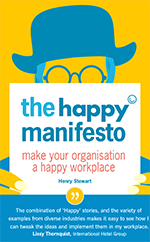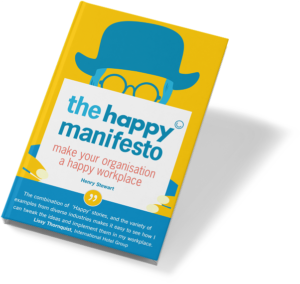
Action for Happiness’ 10 Keys for Happier Living
Over the last 60 years our incomes have increased substantially but surveys show our happiness has not increased at all. This “movement for positive social change” seeks to change that by focusing policy on happiness rather than just increasing GDP.
Action for Happiness details 10 actions to take for a happier life. These include doing things for others (“feel good by doing good”), connecting with people, being active and more. The launch received huge amounts of media attention but there has been some scepticism, especially from those who think actions like this divert from the key political issues.
Now, running a company called Happy, I’m going to be pretty much in favour of a movement for happiness. Indeed the aim of Happy Ltd is to change the way people work in the UK to create happy workplaces and happier lives. One question I asked at the launch was, “how would your workplace be different if the focus of your organisation was on making people feel good?”
This is based on the belief that people work best when they feel good about themselves, a statement that most people agree with. I believe that those organisations that do make this their focus are not only happier, but more effective. Imagine what work would be like if people were valued and given freedom within clear guidelines. If there was a no blame culture. If people were recruited and promoted based on their attitude and support for others. And, best of all, if people could actually choose their managers.
I see that as pretty radical change. Indeed I would argue that one of the problems with political movements in the past is their failure to take account of people’s feelings and needs. Many years ago I was part of an ambitious project to create a radical, campaigning Sunday newspaper. We had great ideals of what we wanted to change but created a terrible workplace and, as a result, also created a pretty poor product.
A real focus on happiness is not politically neutral. We know that the most happy societies are the most equal. That is why Scandinavian countries tend to come top of international happiness surveys. A recent survey found only 6% of the Chinese population was happy in their now very unequal society, which led to the Chinese government banning references to it. (Denmark came top with 72% happy.)
Inequality makes people unhappy. Poverty makes people unhappy. Consumerism makes people unhappy. A real focus on increasing happiness would lead to very radical change in society. Bring it on!























